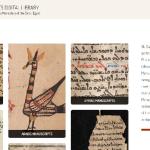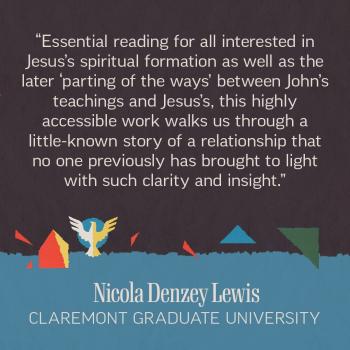This started out as a collection of links, but I also want to float an idea and get feedback on it sooner rather than later. The Gospels depict John the Baptist as predicting someone who comes after him (i.e. one of his followers) being stronger than himself and enacting the judgment that John merely foretells. The Gospels differ on whether John says he is not fit or not worthy to do something with that person’s sandals, and whether the action is carrying his sandals or untying them. Most assume John’s point to have been his subordination to that future figure. But might not the point be strength? Could his overall meaning have been something like: “You think I’m making trouble? One of my followers is going to act with much greater strength and force than I. How strong? He is so much stronger than me that I wouldn’t even be able to untie his shoelaces.” What do you think?
There is a very important article by Yonatan Adler which argues that widespread observance of the Torah may have started only in the Hasmonean era. That would help make sense of something that I have been pondering about John the Baptist and the origin of Gnosticism, some of which I have hinted at in presentations I have given (the Johannite Conclave 2022 talk that I gave should be available sometime soon, I think). I will need to read Adler’s book The Origins of Judaism as soon as it is released.
Also related (inasmuch as 1 Enoch is a potential influence on John) is Phil Long’s new book, The Book of Enoch for Beginners. I had hoped to get to read it and help promote it when it was about to come out, but the timing was right as I was getting ready to leave for England and so proved impossible. The Enochic literature was very influential in this time period and seems to have originated in Galilee. Brent Niedergall has reviewed the book. I will have to do an interview with Phil or something else to make up for not endorsing and writing about the book when I had hoped. For now I will just say that 1 Enoch is in fact a biblical text in the Ethiopian church. It is quoted in the New Testament in the Letter of Jude. It is alluded to and language is borrowed from it in many passages in which the Son of Man is depicted as coming with angels or sitting on a glorious throne to judge the nations. If you don’t understand 1 Enoch then you are missing essential background to understanding the New Testament, and Phil Long’s book is the least expensive way of rectifying that situation that I have come across.
There was an article in TheTorah.com about Hannah, whose story clearly influenced Luke’s infancy story. I think that there is a greater importance to that connection than has previously been realized, and I’m particularly enjoying writing about that topic as I work on my John the Baptist books. I provided a sneak peek of that in the talk I gave as the 2022 Johannite Conclave keynote speaker, and a recording of that should be available in the coming months. I will also be giving a talk about this at the University of Edinburgh’s Center for the Study of Christian Origins in December. I’ll share information about that soon, but in the meantime I’ll leave the specific things that I have been thinking about shrouded in mystery.
Craig Keener did a video discussing proselyte baptism and John’s baptism. One thing that many fail to notice is that our evidence for proselyte baptism comes from sources after John’s time. That means that while it is possible that John was influenced by proselyte baptism, it is also possible that the reverse occurred, i.e. that John’s baptism influenced the development of proselyte baptism.
I found myself pondering John’s baptism when reading the recent Christian Century article about our need for rituals of collective grief. I think that John was trying to call Israel to repentance and grief when many were trying to foster hope instead. Some were indignant, but many would have found it cathartic.
Another article in Christian Century intersects with John by way of the possible connection of Jesus infancy stories to earlier infancy stories about John. Unfortunately it botches way too much about the history of the era to work. The Herodians were client rulers, whereas the appointment of a Roman governor over Judaea meant the elimination of client rule and a shift to direct Roman rule. The author also seems to believe that there was in fact a census that required people to move elsewhere for taxation purposes, something that makes no sense whatsoever.
There’s also a new book on baptism in Romans.
As an update from me in Oxford, the only services I have not managed to get to here at Magdalen College are the evening Compline services at 9 pm. You (and I) can see what I’ve been missing here. I have, on the other hand, attended every Choral Evensong and Choral Evening Prayer service as well as the Sung Eucharist on Sunday. The music has been so incredible. Worship through music by William Walton, Herbert Howells, Sydney Watson, and Kenneth Leighton, in addition to Tomkins and Purcell and others of earlier eras. Upcoming services will include other composers I love such as Ralph Vaughan Williams, Sergei Rachmaninoff, Nadia Boulanger, Arvo Part, and George Dyson













